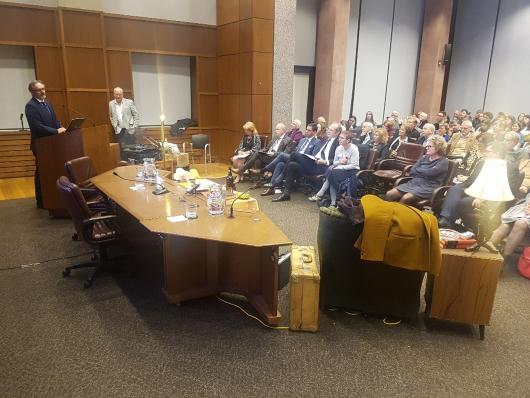“Making and Remaking Europe: The Czech and Slovak Contribution”
02.01.2019 / 18:26 | Aktualizováno: 02.01.2019 / 18:38
Consul General of the Czech Republic in Toronto Ivan Počuch, opened an exhibition entitled „For Your Freedom and Ours“ as part of a conference commemorating the 100th Anniversary of the founding of Czechoslovakia, “Making and Remaking Europe: The Czech and Slovak Contribution“.
The photographic exhibit prepared by the Institute for the Study of Totalitarian Regimes in Prague titled „For Your Freedom and Ours“ served as a witness of the protests against the occupation of Czechoslovakia in 1968 in other countries of the Communist block. Reflection on events of 1968 is evoked by using authentic interviews, photographs and documents mapping life stories of the protesters. The exhibition was opened on the occasion of the evening programme of the opening day of the conference. The evening´s cultural event aimed at the Czechoslovak underground culture attracted a great number of attendees, both from the local Czech and Slovak community and Canadians such as university students as well as members of the diplomatic corps who filled the conference room to capacity.
The entire conference was organized by the University of Toronto´s prestigious Munk School of Global Affairs, an institiute aimed at studying middle and eastern Europe. The second day of the conference was of an entirely academic nature and concentrated on topics such as the founding and organization of interwar Czechoslovakia, the legacy of communism in Europe, and the Czech and Slovak diaspora. The panels were attended by an impressive lineup of experts from universities such as George Washington University, Cardiff University, University of Washington, McGill University, Royal Military College, Sorbonna, Masaryk University and others. The entire day was concluded by a screening of the documentary „Nagano Tapes“.
The last day of the conference was dedicated to students and round tables about experience with the post-communist world. Individual panels focused on the transition of former Austro-Hungarian states into independent democracies after the First World War and their historical and ideological ties as well as to the legacy of socialism and failed attempts at change in Hungary (1956), Czechoslovakia (1968) and Poland (1956, 1968 and 1970). The concluding panel brought a discussion on Central and Eastern European immigrants and diasporas in the world and their impact particularly on North America and on North American culture.






Follow us on